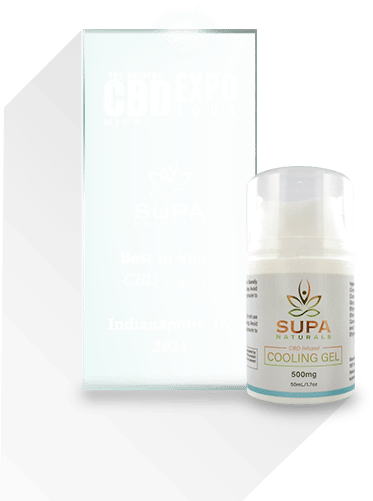How Does CBD Make You Feel?
You can find plenty of sources talking about the beneficial properties of cannabidiol (CBD) extract, such as relief of pain, inflammation, anxiety, and high blood pressure. However, it’s harder to find an answer to an important question: how does CBD oil make you feel?
CBD extracts come from the cannabis plant, which contains various chemical compounds like cannabinoids, terpenes, and flavonoids. Each of these cannabis-derived compounds affects the human body in different ways, and CBD products typically contain some combination of them.
What Does It Feel Like When Taking CBD Oil?
Tetrahydrocannabinol (THC) also comes from the cannabis plant but produces a significant psychoactive effect associated with being “high”. Many people choose CBD because it doesn’t cause physical or mental impairment and provides impressive health benefits.
So, what does CBD feel like? CBD users report feelings of calm and relaxation. Rather than making you “feel something,” CBD helps treat pain and other symptoms to improve your quality of life. You experience an absence of negative symptoms instead of feeling high.
While the effects are similar for most people, many variables factor into how you’ll respond to CBD, including:
- The dosage
- The type of CBD
- The plant CBD comes from
- The method of extraction
Some types of CBD could contain more THC than others, causing a more psychotropic effect. CBD oils from the hemp plant typically contain less than 0.3% THC, which is the standard lawful amount in all U.S. states.
Without a significant amount of THC, you will not feel high from a regular dose of CBD. Instead, you’ll feel your body regain its balance, whether that’s an absence of pain or a boost of energy. Taking exceedingly high doses of CBD, over 1,000 mg, might make you feel light-headed while your body absorbs a large number of cannabinoids.
CBD vs THC
Here’s another important question: how does CBD feel compared to THC? While THC can make you feel a sense of euphoria and relaxation, CBD has a much more subtle effect. CBD works differently than THC in your body and can make you feel calm without the intense psychoactive effects.
CBD oil can come from two different types of cannabis plants, typically known as hemp and marijuana. Growing industrial hemp plants and selling hemp-derived CBD oil has been federally legal since the passage of the 2018 Farm Bill. However, marijuana-derived CBD oil is illegal in most states besides those that have legalized recreational or medical marijuana.
CBD from the cannabis sativa hemp plant usually has less than 0.3% THC, making it compliant with federal law. Hemp-derived CBD oil products contain tiny amounts of THC, meaning you won’t feel the psychoactive effects associated with the compound.
CBD products with extracts from the marijuana plant generally have higher levels of THC and could potentially induce a feeling of being “high.” Before purchasing marijuana-derived CBD oil, you should research the laws in your state to ensure that you’re not violating any rules.
The Three Most Common Types of CBD

You probably know that CBD products come in various forms, such as CBD edibles, topicals, oil, and capsules. Did you know that each of those products can be a different type of CBD? The type depends on what is in the CBD product besides pure CBD, including minor cannabinoids, terpenes, and THC.
Which CBD product you choose can affect how it makes you feel and how effective it is at helping with things like chronic pain.
Full-spectrum CBD Oil
Full-spectrum CBD oil contains all the cannabinoids, terpenes, and flavonoids from cannabis plants, including CBD, cannabinol (CBN), cannabigerol (CBG), and THC. All these ingredients together give you what’s known as the “entourage effect,” a highly effective combination.
Most full-spectrum CBD products have less than 0.3% THC in compliance with federal law.
Broad-spectrum CBD Oil
Broad-spectrum CBD oil is almost the same as full-spectrum, but without THC. The extraction process involves filtering out all traces of THC, which eliminates the chance of feeling psychoactive effects while maintaining the benefits of CBD and other minor cannabinoids.
Since CBD containing THC can appear on drug tests, you should choose broad-spectrum CBD oil products if your work or school tests for substances.
CBD Isolate
CBD isolate has no additional cannabinoids, terpenes, or THC. It is nearly 100% pure CBD and appears in the form of a fine white powder. Pure CBD is a popular alternative for individuals who want to avoid ingesting THC but want the health benefits of CBD.
Understanding How CBD Interacts With Our Body

CBD interacts with a crucial system in our bodies to promote balance. As recently as the ’90s, scientists discovered the existence of the endocannabinoid system (ECS), which is present in every human and animal. The ECS is a complex system that spans your entire body and has significant effects on the function of processes like:
- Mood
- Sleep
- Appetite
- Memory
- Immune system
The ECS contains three primary components: endocannabinoids, receptors, and enzymes. The endocannabinoids we know the most about are anandamide (AEA) and 2-arachidonoylglycerol (2-AG). Your body naturally produces these compounds as needed.
The endocannabinoid system receptors that CBD mainly interacts with are the CB1 and CB2 receptors. Endocannabinoids bind to these receptors to signal to your body that it needs to take action, such as relieving pain and inflammation.
Most of your CB1 receptors are within your central nervous system, around your brain and spine. CB2 receptors are mostly in the peripheral nervous system, which affects your immune system. The enzymes in the ECS break down AEA and 2-AG after they have served their function.
Studies found that THC binds to receptors in the ECS, creating a “high” and other symptoms like drowsiness and increased appetite. Unlike THC, CBD doesn’t bind with the ECS receptors. Instead, it acts as an antagonist to the enzymes that break down the endocannabinoids, allowing them to stay in your body longer.
It’s still early in the game for CBD, and we don’t know all the details of how it interacts with the ECS. CBD appears to influence the ECS to encourage homeostasis in your body, bringing equilibrium to essential processes that keep you physically and mentally healthy.
Are There Any Side Effects You Should Watch Out For?
Researchers discover new things about the science and effects of CBD every day, but no one has reported any serious adverse effects in their studies. This lack of side effects is one of the biggest reasons medical researchers are flocking to CBD to find out if it can be a solution to a number of health conditions.
Prescription drugs can cause severe effects, especially when high doses are necessary for treatment. If side effects appear when taking CBD, they are typically minor, such as drowsiness, diarrhea, nausea, and a change in appetite. With more research, CBD could become an effective medical alternative to opioids and other drugs.
However, with the lack of regulation in the growing CBD industry, it’s vital that you research products before using them. Look for reliable companies with verified reviews to reduce the chance of you purchasing a low-quality product or one that falsely advertises its THC or CBD dosage.
SUPA Natural’s high-quality CBD products are all confirmed by third-party laboratories in lab reports to adhere to the federal limits and are confirmed to be safe and reliable. Check out our wide variety of edibles, tinctures, and more at our store page for some of the most reliable and effective CBD products on the market.
How Long Will You Experience the Effects of CBD?

The duration of CBD’s effects can vary depending on which product you use, the method of consumption, and your body (weight, metabolism, ECS). The most common CBD products include oil, vapes, edibles, capsules, and topical creams.
The active effects of CBD typically last 2 to 6 hours, but how quickly it kicks in depends on how you ingest or use it.
- Vapes (lungs): 2 to 5 minutes
- Oil (mouth tissue): 15 to 45 minutes
- Edibles and capsules (digestive system): 30 minutes to 2 hours
- Topical (skin): 45 minutes to an hour
Why CBD Effects Vary From Person to Person
Some people take CBD to conquer insomnia and get restful sleep, while others use it for an energy boost before work. How can one product have two seemingly opposite effects? One explanation lies with the endocannabinoid system.
The ECS is a network of receptors throughout your body, and the specific area that CBD interacts with can influence the effect it has on you. For example, if CBD reacts with endocannabinoids in your limbic system, it can affect memory and cognition.
Some people have a more balanced ECS, while others produce a disproportionate amount of certain endocannabinoids. Besides the ECS, your body weight and metabolism can affect your dosage and results of using CBD oil. You also might react differently to CBD because of your genetics and unique internal chemistry.
Can I Take CBD While Taking Other Products or Medications?

For the most part, CBD doesn’t react negatively with other products and medications, but it’s not without exceptions. You should always consult with your doctor before mixing health supplements, such as medication, and CBD oil.
Alcohol
Mixing CBD with alcohol doesn’t cause any adverse interactions. Some researchers claim that CBD and alcohol could amplify the effects of each other, primarily the feeling of relaxation. CBD might also have benefits when combined with alcohol, such as:
- Prevent alcohol-related disease
- Reduce alcohol blood levels
- Provide therapeutic benefits for alcohol addiction
Medications
CBD can have an effect on the enzymes in your liver that metabolize medications, creating a situation known as altered concentration. If CBD interferes with the enzymes breaking down your prescription medications, it could lead to more or less of the drug being present in your body. The result could be an increased risk of side effects like drowsiness, nausea, and diarrhea.
Common drugs that may react negatively with CBD include:
- Warfarin, a blood thinner
- Levothyroxine, a thyroid medication
- Amiodarone, a heart rhythm medication
Always consult your primary physician before taking CBD with medications. The research on the relationship between CBD and medicine is still developing, but the potential for game-changing benefits is apparent. If scientists can find a safe method, CBD might work to reduce the dose of prescription drugs a patient needs to take to get the desired effects.
Mushrooms
Mushrooms containing psilocybin can have positive effects on your mental health, reducing depression, anxiety, and addiction symptoms. Both CBD and mushrooms are organic products with similar calming effects: CBD provides pain relief, while mushrooms improve your mood. Combining them can enhance your overall wellness and sense of calm, but be sure to start with small doses and increase over time to find what balance works best for you.
Mixing CBD with adaptogenic mushrooms (or mushrooms that don’t produce psychedelic effects such as lion’s mane or cordyceps) has the potential to even further alleviate the symptoms people often use CBD for, since there is a considerable overlap between the functions of adaptogenic mushrooms and CBD. Some of the benefits of mixing the two include improved mood and concentration as well as boosting your immune system. As always, practice caution before mixing the two to find out what range of products is comfortable for you.
Vitamins
While CBD doesn’t influence the effects of most vitamins, it can hinder or even enhance some supplements. Vitamin D and Ginkgo Biloba might lose effectiveness when combined with CBD, but the cannabinoid can reduce the negative side effects of iron and increase the absorption of fish oil.
Can You Get Addicted to CBD?

The powerful effects of THC can lead to dependence and withdrawal symptoms in some people. CBD products typically have insignificant amounts of THC, and pure CBD isolate has zero THC. Research on CBD’s ability to treat various health issues has produced no evidence that CBD is addictive.
The low risk of abuse is one of the reasons CBD products are popular medical alternatives. A 2019 study showed that administering 400 to 800 mg of CBD significantly reduced cravings and anxiety in individuals recovering from heroin addiction.
However, less trustworthy products might contain more THC than what they say on the label. If you feel high after taking CBD that supposedly has less than 0.3% THC, it may be a mislabeled product with higher amounts of THC.
Can You Overdose on CBD?
Research shows that humans can handle up to 1,500 mg of CBD per day, but the typical dose is much lower. Individuals just starting out with CBD might take as little as 25 mg to test their reaction before increasing the dose. CBD oil bottles usually contain 250, 500, or 1,000 mg with a recommended single dose of 1 mL of oil, which might contain between 20 and 65 mg of CBD.
With that being said, it’s incredibly difficult to unintentionally take too much CBD oil as a result of our natural high tolerance. If you do consume large amounts of CBD, the side effects could include vomiting, diarrhea, and drowsiness.
While negative reactions are rare, you should always be cautious when taking CBD and other supplements. You should always consult your primary physician before starting any new medication.
If you decide to start using CBD, we recommend starting with a low dose and working your way up over time. Taking it slow significantly reduces your chances of experiencing negative side effects.
Feel SUPA Good With All-Natural CBD Oil
What does CBD feel like? Hopefully, we’ve answered your question. At SUPA Naturals, we want to share the amazing benefits of CBD with the world. We believe that CBD can change your life for the better by helping you manage conditions like chronic pain and anxiety.
If you are interested in trying a CBD product, we carry organic, non-GMO CBD topicals, edibles, oil, and more. Still have questions? Our friendly team at SUPA Naturals would be happy to share our knowledge with you.
Contact us by filling out our online form.






